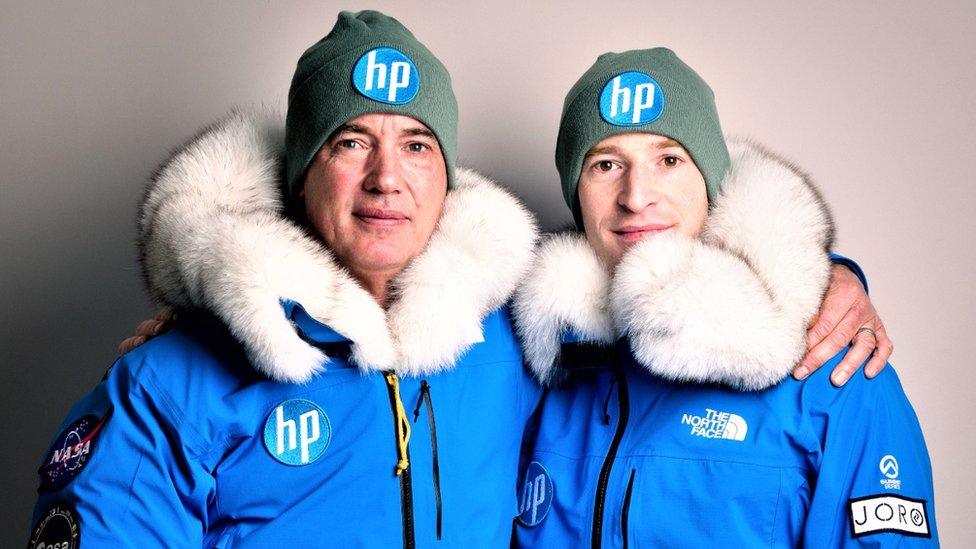Adventurers take on ice trek to help Nasa with future Mars mission
- Published
- comments

Antarctica - it is one of the coldest, emptiest and most dangerous places on this planet.
The continent stretches for 5.5 million square miles across, with thick ice covering most of its surface.
But this icy desert is the perfect environment for two explorers looking to demonstrate what could be possible on the surface of a world far further away - Mars.
Scientists believe the extreme conditions and strange landscape are similar to what future astronauts would face during missions to the moon and the Red Planet, so they've enlisted two British explorers to help them out.
Jamie and Justin will travel 2,500 miles in 80 days - this map of their trek shows how big Antarctica is in comparison to the UK
For three weeks, British adventurers Justin Packshaw and Jamie Facer Childs have been trekking across the ice, battling 100mph winds and temperatures of minus 56 degrees Celsius.
If you want an idea of how cold this is, the average freezer temperature in the UK is minus 18 degrees Celsius - that's 36 degrees warmer than the coldest days they'll face in Antarctica!
Using a combination of skis, kites and walking, the duo will travel 2,500 miles in total over just 80 days, each dragging 200kg of equipment and supplies - which is about the weight of an upright piano!
Along the way they will reach a place called the Pole of Inaccessibility - so called because it's the most central and inhospitable part of the continent.
Justin and Jamie are working with Nasa and Stanford University to help them understand how well humans can cope in extreme environments.
Twice a week, the daring pair are undergoing a series of tests to monitor their physical and mental health.
They are also wearing smart technology that measures their heart rate, stress levels and sleep.
In order to keep their energy up for this gruelling experience, they are eating 8,000 calories a day!
That's equivalent to eating 76 bananas a day! We're not monkeying around...
If this wasn't enough of a challenge, Justin and Jamie have also been tasked by the European Space Agency (ESA) to collect data on their environment - such as wind speed, ice levels and radiation.
Funnily enough, more than three weeks in, the pair seem to be enjoying their trip so far!
"The irony is that we're loving it," Justin said.
"We've been having an adventure and we're savouring every moment."
Packshaw and Childs hope to complete their journey by the start of February.
The website for the expedition says: "Much like the extreme conditions found on planets in our Solar System, Antarctica has a [harsh] environment that is useful for a range of human and biological research...
"Justin and Jamie's mission will allow scientists to observe a rare scientific story of human adaptability, which will ultimately contribute to... human centred space exploration."
- Published6 February 2023
- Published18 July 2018
- Published11 February 2018
